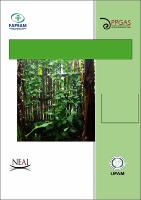| ???jsp.display-item.social.title??? |


|
Please use this identifier to cite or link to this item:
https://tede.ufam.edu.br/handle/tede/11283| ???metadata.dc.type???: | Tese |
| Title: | Territorialidades indígenas e conexões vegetais: entre cidades e aldeias no Médio Solimões |
| ???metadata.dc.creator???: | Câmpera, Luiza Maria Fonseca  |
| ???metadata.dc.contributor.advisor1???: | Santos, Gilton Mendes dos |
| ???metadata.dc.contributor.referee1???: | Cardoso, Thiago Mota |
| ???metadata.dc.contributor.referee2???: | Bruno, Ana Carla dos Santos |
| ???metadata.dc.contributor.referee3???: | Matarezio Filho, Edson Tosta |
| ???metadata.dc.contributor.referee4???: | Angarita, Abel Antonio Santos |
| ???metadata.dc.description.resumo???: | Esta tese tem como objetivo central explorar as relações entre as territorialidades, lugares, plantas e as narrativas indígenas da região do médio Solimões.A pesquisa inicia com uma reflexão sobre as conexões entre plantas, etnografias e os desafios da antropologia contemporânea, situando a Amazônia como espaço de complexas relações entre pessoas, lugars e seres não humanos. A discussão de como os lugares funcionam como marcadores relacionais é central na construção dos lugars tikuna no médio Solimões, preparando o terreno para compreender a centralidade das plantas na vida social indígena e os processos de trânsito territorial desses coletivos. O texto narra as travessias pelo rio Solimões, os desafios de etnografar essa região e os principais aspectos da experiência de campo em Coari, com destaque para a aldeia Bom Jesus do Igapó Grande e para o papel das lideranças cacicais. Reúne experiências de etnografias vividas e interrompidas, reflexões sobre o fazer antropológico em contexto de pandemia, a presença massiva tikuna em Tefé, e uma análise das plantas como agentes formadores do ser, em especial o jenipapo, o tabaco e as bebidas fermentadas. Desloca o olhar para os coletivos indígenas em cidades dos beiradões do rio Solimões, investigando como os lugares e as plantas se entrelaçam em contextos urbanos. O texto aprofunda a relação entre plantas e lugares no médio Solimões, mostrando como os saberes indígenas reconhecem as plantas como mediadoras de espaços e relações. A análise evidencia a cosmovisão tikuna, onde as plantas são fundamentais para a constituição do lugar, concluindo que elas funcionam como bioindicadores do corpo–lugar, expressão de resistência e continuidade da vida indígena. |
| Abstract: | This thesis aims to explore the relationships between territorialities, places, plants, and Indigenous narratives in the Middle Solimões region. The research begins with a reflection on the connections between plants, ethnography, and the challenges of contemporary anthropology, situating Amazonia as a space of complex relations among people, territories, and non-human beings. Central to the discussion is how places function as relational markers in the construction of Tikuna territories in the Middle Solimões, laying the groundwork for understanding the centrality of plants in Indigenous social life and in the territorial movements of these collectives. The text narrates crossings along the Solimões River, the challenges of conducting ethnography in this region, and key aspects of fieldwork in Coari, highlighting the village of Bom Jesus do Igapó Grande and the role of cacique leadership. It brings together experiences of lived and interrupted ethnographies, reflections on anthropological practice in the context of the pandemic, the significant Tikuna presence in Tefé, and an analysis of plants as agents in the making of persons, particularly jenipapo, tobacco, and fermented beverages. The focus then shifts to Indigenous collectives in riverside cities along the Solimões, investigating how places and plants intertwine in urban contexts. The text further deepens the relationship between plants and places in the Middle Solimões, showing how Indigenous knowledge recognizes plants as mediators of spaces and relations. The analysis highlights the Tikuna worldview, in which plants are fundamental to the constitution of territory, concluding that they act as bioindicators of the body–territory, as expressions of Indigenous resistance and the continuity of life. |
| Keywords: | Ticuna (Povo indígena) - Usos e costumes Etnologia |
| ???metadata.dc.subject.cnpq???: | CIENCIAS HUMANAS: ANTROPOLOGIA |
| ???metadata.dc.subject.user???: | Plantas Lugares Tikuna Solimões |
| Language: | por |
| ???metadata.dc.publisher.country???: | Brasil |
| Publisher: | Universidade Federal do Amazonas |
| ???metadata.dc.publisher.initials???: | UFAM |
| ???metadata.dc.publisher.department???: | Instituto de Filosofia, Ciências Humanas e Sociais |
| ???metadata.dc.publisher.program???: | Programa de Pós-graduação em Antropologia Social |
| Citation: | CÂMPERA, Luiza Maria Fonseca. Territorialidades indígenas e conexões vegetais: entre cidades e aldeias no médio Solimões. 2025. 201 f. Tese (Doutorado em Antropologia Social) - Universidade Federal do Amazonas, Manaus (AM), 2025. |
| ???metadata.dc.rights???: | Acesso Aberto |
| ???metadata.dc.rights.uri???: | https://creativecommons.org/licenses/by-nc-nd/4.0/ |
| URI: | https://tede.ufam.edu.br/handle/tede/11283 |
| Issue Date: | 14-Aug-2025 |
| Appears in Collections: | Doutorado em Antropologia Social |
Files in This Item:
| File | Description | Size | Format | |
|---|---|---|---|---|
| TESE_LuizaCampera_PPGAS.pdf | 5.26 MB | Adobe PDF |  Download/Open Preview |
Items in DSpace are protected by copyright, with all rights reserved, unless otherwise indicated.




